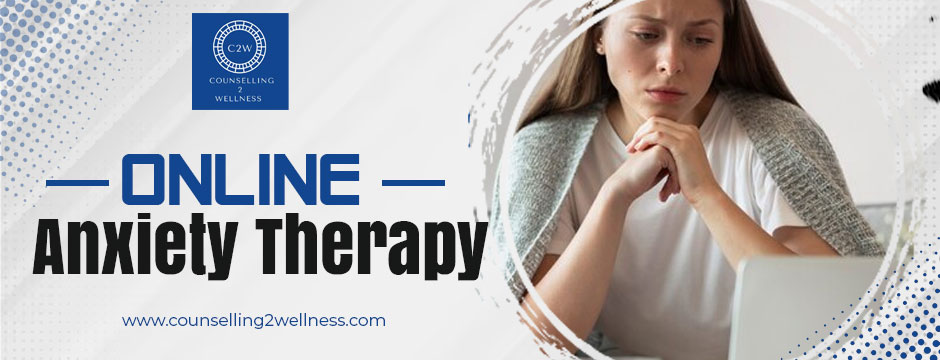In today’s fast-paced world, the way we seek and receive therapy has evolved. Online anxiety therapy has gained immense popularity, offering convenience and accessibility to those seeking help with their anxiety-related challenges. However, is it the right choice for you? In this comprehensive guide, we’ll dive deep into the world of online anxiety therapy, exploring its pros and cons, and helping you make an informed decision about whether it aligns with your needs.
Your content goes here. Edit or remove this text inline or in the module Content settings. You can also style every aspect of this content in the module Design settings and even apply custom CSS to this text in the module Advanced settings.

1. Accessibility and Convenience:
-
- No Travel Required: One of the most significant advantages of online anxiety therapy is its accessibility. You can access therapy from the comfort of your own home, eliminating the need for travel to a therapist’s office. For those dealing with anxiety, this can be a game-changer as it reduces the stress associated with commuting and navigating unfamiliar environments.
- Flexible Scheduling: Online therapy often offers more flexible scheduling options, including evenings and weekends, making it easier for individuals with busy lives to seek help. This flexibility can be particularly beneficial for those juggling work, family, and other commitments.
2. Privacy and Comfort:
-
- Enhanced Privacy: Online therapy offers a higher degree of privacy and anonymity compared to traditional face-to-face therapy. Many people find it easier to open up about their anxiety issues when they are in the comfort of their own space. This sense of privacy can lead to more honest and productive therapy sessions.
-
- Familiar Environment: Being in a familiar environment can help clients feel more at ease during therapy sessions. This comfort can contribute to a sense of security and make it easier for individuals to explore and address their anxiety-related challenges.
3. A Wider Range of Therapists:
-
- Increased Choice: Online therapy allows you to choose from a broader pool of therapists. You can work with a professional who specializes in anxiety therapy, even if they are not in your immediate geographic location. This increased choice can improve your chances of finding a therapist who is the right fit for you.
-
- Specialized Expertise: Online platforms often connect you with therapists who have specific expertise in treating anxiety disorders. This specialized knowledge can lead to more effective treatment and better outcomes.
4. Flexible Communication Options:
-
- Various Communication Channels: Online therapy platforms offer a variety of communication options, including video calls, phone calls, and messaging. This flexibility allows you to choose the mode of communication that feels most comfortable for you, enhancing the therapeutic experience.
-
- No Face-to-Face Pressure: For some individuals, the absence of face-to-face interaction can alleviate the pressure or social anxiety that may arise during in-person therapy sessions.
Cons of Online Anxiety Therapy
1. Lack of In-Person Connection:
-
- Limited Non-Verbal Cues: One of the primary limitations of online therapy is the absence of in-person connection. Some people find it challenging to build a strong therapeutic relationship through a screen. In traditional therapy, therapists can observe non-verbal cues like body language and facial expressions, which may not be as readily apparent in an online setting.
- Potential Disconnect: The lack of physical presence may lead to a perceived disconnect between therapist and client, which can impact the depth of communication and the therapeutic bond.
2. Technical Issues:
-
-
- Tech Hurdles: Online therapy sessions rely on technology, and technical issues such as poor internet connection or software glitches can disrupt sessions. These disruptions can be frustrating and may affect the quality of therapy.
-
- Security Concerns: Ensuring the security of your online therapy sessions is essential. You must use secure and encrypted platforms to protect your personal information and maintain confidentiality.
-
3. Limited Emergency Response:
-
- Emergency Situations: In cases of severe anxiety or crisis, online therapists may not be able to provide immediate in-person assistance. It’s crucial to have a plan in place for handling emergencies, especially when using online therapy.
-
- Crisis Intervention: If you are at risk of self-harm or experiencing a mental health crisis, online therapy may not be the most suitable option, as it may not provide the immediate intervention that some situations require.
4. Not Suitable for All Conditions:
-
- Complex Cases: Online therapy may not be suitable for all forms of anxiety disorders, especially severe or complex cases. Some individuals may benefit more from in-person therapy, where the therapist can provide a higher level of support and intervention.
-
- Assessment Challenges: Diagnosing certain conditions or assessing the severity of symptoms can be more challenging in an online setting, as therapists may have limited information to work with.

Making an Informed Decision
In the realm of mental health, there is no one-size-fits-all approach. The decision to opt for online anxiety therapy in Toronto should be based on your individual circumstances and preferences. To make an informed choice:
- Evaluate Your Comfort Level: Consider your comfort level with technology and online communication. Ensure you have access to the necessary equipment and a stable internet connection.
- Assess the Severity of Your Anxiety: Reflect on the severity of your anxiety and whether it requires immediate in-person intervention. Consult with a mental health professional to determine the most appropriate treatment approach.
- Consider Scheduling Needs: Think about your scheduling needs and how they align with the flexibility of online therapy. Determine whether the convenience of online therapy suits your lifestyle.
- Choose a Reputable Provider: Research and choose a reputable online therapy platform or provider. Read reviews, check credentials, and verify that they prioritize client privacy and security.
- Consult a Mental Health Professional: Discuss your options with a mental health professional who can help you determine the best course of action based on your specific needs.
Conclusion
Online anxiety therapy offers significant advantages in terms of accessibility and convenience, but it also comes with potential limitations, such as the lack of in-person connection. Your decision should be guided by your unique circumstances and requirements. By carefully weighing the pros and cons and seeking guidance from a mental health professional, you can make an informed choice that supports your journey toward managing and overcoming anxiety.
Want to find out more? Visit us at Counselling 2 Wellness!

